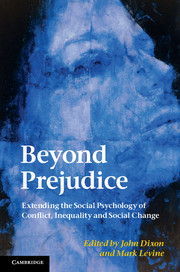Book contents
- Frontmatter
- Contents
- Figures
- Tables
- Contributors
- Acknowledgements
- Introduction
- Part I Beyond prejudice
- 1 From perception to mobilization: the shifting paradigm of prejudice
- 2 Prejudice, social identity and social change: resolving the Allportian problematic
- 3 An ambivalent alliance: hostile and benevolent sexism as complementary justifications for gender inequality
- 4 Prejudice and dehumanization
- 5 Stereotyping, prejudice and discrimination revisited
- 6 Beyond ‘old’ and ‘new’: for a social psychology of racism
- 7 The notion of ‘prejudice’: some rhetorical and ideological aspects
- 8 The prejudice problematic
- 9 Implicit prejudice in mind and interaction
- 10 Rethinking the prejudice problematic: a collaborative cognition approach
- Part II Prejudice and social change revisited
- Index
- References
5 - Stereotyping, prejudice and discrimination revisited
from William James to W. E. B. Du Bois
from Part I - Beyond prejudice
Published online by Cambridge University Press: 05 June 2012
- Frontmatter
- Contents
- Figures
- Tables
- Contributors
- Acknowledgements
- Introduction
- Part I Beyond prejudice
- 1 From perception to mobilization: the shifting paradigm of prejudice
- 2 Prejudice, social identity and social change: resolving the Allportian problematic
- 3 An ambivalent alliance: hostile and benevolent sexism as complementary justifications for gender inequality
- 4 Prejudice and dehumanization
- 5 Stereotyping, prejudice and discrimination revisited
- 6 Beyond ‘old’ and ‘new’: for a social psychology of racism
- 7 The notion of ‘prejudice’: some rhetorical and ideological aspects
- 8 The prejudice problematic
- 9 Implicit prejudice in mind and interaction
- 10 Rethinking the prejudice problematic: a collaborative cognition approach
- Part II Prejudice and social change revisited
- Index
- References
Summary
During the mid-to-late 1990s, Edward Reed and I (Gaines and Reed, 1994, 1995; Reed and Gaines, 1997) published a series of articles on prejudice. We consistently contrasted Gordon Allport’s (1954) mainstream, white-oriented perspective on prejudice with W. E. B. Du Bois’s (1903/2004) non-mainstream, black-oriented perspective on prejudice. We argued that in order to understand the causes and consequences of prejudice in all their complexity, mainstream social psychologists would need to acquaint themselves with Du Bois’s (1903/2004) The Souls of Black Folk as well as with Allport’s (1954) The Nature of Prejudice. Although our perspective was criticized in some quarters (e.g. Lee, 1996; see also Collins and Gleaves, 1998), the overwhelmingly positive responses that we received (e.g. Jones, 1997; Markus, 2008; Phinney, 1996; Sellers et al., 1998) suggested to us that we had identified a genuine gap in the mainstream literature on stereotyping, prejudice and discrimination (for a discussion of the links among these concepts, see Fiske, 1998).
At the time of Ed Reed’s death (see Mace, 1997), Ed and I were beginning to move away from our original Allport–Du Bois comparisons and towards a deeper understanding of Du Bois’s (1903/2004) self-theory in its own right. Indeed, Sellers et al. (1998) pointed out that although Ed and I (Gaines and Reed, 1994, 1995) ostensibly focused on mainstream versus non-mainstream perspectives on prejudice, we actually devoted much of our commentary to mainstream versus non-mainstream perspectives on racial identity. Our brief comparisons between James’s (1890) white-oriented self-theory and Du Bois’s (1903/2004) black-oriented self-theory hint at our fascination with the implications of Du Bois’s self-theory for black racial identity development. In the present chapter, I shall expand on the theme of racial identity as articulated in Du Bois’s self-theory.
- Type
- Chapter
- Information
- Beyond PrejudiceExtending the Social Psychology of Conflict, Inequality and Social Change, pp. 105 - 119Publisher: Cambridge University PressPrint publication year: 2012



